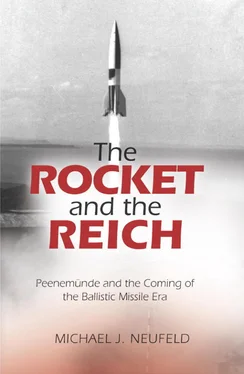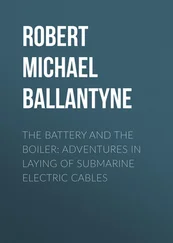Michael Neufeld - The Rocket and the Reich
Здесь есть возможность читать онлайн «Michael Neufeld - The Rocket and the Reich» весь текст электронной книги совершенно бесплатно (целиком полную версию без сокращений). В некоторых случаях можно слушать аудио, скачать через торрент в формате fb2 и присутствует краткое содержание. Город: Washington, Год выпуска: 2013, ISBN: 2013, Издательство: Smithsonian Books, Жанр: История, military_weapon, на английском языке. Описание произведения, (предисловие) а так же отзывы посетителей доступны на портале библиотеки ЛибКат.
- Название:The Rocket and the Reich
- Автор:
- Издательство:Smithsonian Books
- Жанр:
- Год:2013
- Город:Washington
- ISBN:978-1-58834-466-3
- Рейтинг книги:3 / 5. Голосов: 1
-
Избранное:Добавить в избранное
- Отзывы:
-
Ваша оценка:
- 60
- 1
- 2
- 3
- 4
- 5
The Rocket and the Reich: краткое содержание, описание и аннотация
Предлагаем к чтению аннотацию, описание, краткое содержание или предисловие (зависит от того, что написал сам автор книги «The Rocket and the Reich»). Если вы не нашли необходимую информацию о книге — напишите в комментариях, мы постараемся отыскать её.
The Rocket and the Reich — читать онлайн бесплатно полную книгу (весь текст) целиком
Ниже представлен текст книги, разбитый по страницам. Система сохранения места последней прочитанной страницы, позволяет с удобством читать онлайн бесплатно книгу «The Rocket and the Reich», без необходимости каждый раз заново искать на чём Вы остановились. Поставьте закладку, и сможете в любой момент перейти на страницу, на которой закончили чтение.
Интервал:
Закладка:
The demonstration was held in the early morning on June 22. In order to maintain secrecy, Nebel was to appear with his car at 4 A.M. outside the Kummersdorf range. A long aluminum launch rack with the rocket inside was mounted on the open-topped car. Traveling with Nebel were Klaus Riedel and Wernher von Braun. After a long roundabout trip on poor roads that may have damaged the fragile rocket, the group and and its Army hosts arrived at the launch site, which was, von Braun recalled, “covered with photo-theodolites, ballistic cameras, and all sorts of equipment we then never knew existed.” Among the Army participants were Becker, von Horstig, Schneider, Dornberger, and Dr. Erich Schumann, a physicist who directed a small research branch of Section 1 and held a professorship at the University of Berlin. Schumann was close to the Nazi Party and would become a key administrator in the science policy of the Third Reich. 32
The unlikely looking vehicle that Nebel and his assistants launched was 4 meters (13 feet) long, and the main body was only 6 centimeters (2.4 inches) in diameter. It weighed about 12 kilograms when fueled, had an engine with a water-cooling jacket in the nose, and the parachute and flare in a tail compartment with ineffective little fins. Around 6:30 A.M. the rocket was ignited and rose rather too slowly from its rack, swung lightly back and forth and then turned over into an almost horizontal trajectory. It reached no more than 600 meters in height after piercing the low cloud deck and crashed 1,300 meters (less than a mile) away without ever opening its parachute. 33
Ordnance’s observers made known their displeasure on the spot. The conclusion to Captain Schneider’s launch report expresses their renewed distaste for Nebel:
Once again it is apparent that Nebel works unreliably and that his assertions must be treated with the greatest skepticism, since in his meeting with our office he described the promised maximum altitude, 8 km, as no problem, yet at the launch he no longer would speak of this figure. Even the altitude that he guaranteed there, 3.5 km, was not reached in the actual test. For Testing Division, the conclusion must be reached that closer cooperation with Nebel is out of the question, even though he was able to produce liquid-fuel rocket with an engine that worked well for a duration of many seconds, because he makes assertions against his better judgment. 34
In short, the Army thought he was a liar and refused to pay.
In the aftermath, Nebel repeatedly visited the offices of Army Ordnance to argue over the outcome, but it was a waste of time. Eventually the twenty-year-old von Braun visited Ordnance and found Becker, in contrast to Nebel’s description, warm, knowledgeable, and scientific. The two established an immediate personal connection. Becker outlined Ordnance’s objections to the Raketenflugplatz’s unsystematic approach: “What we need first is accurate measurements and data…. How do you measure your propellant consumption, your combustion pressure, your thrust?” Becker also criticized the publicity-seeking approach of the group, which deeply offended his desire for secrecy. He offered the rocketeers a chance to work for him, but only “behind the fence of an Army post.” 35
The failed demonstration was a crucial turning point; from then on, Ordnance concentrated on building up its own in-house liquid-fuel rocket program. A drawing dated June 24, only two days after the launch, shows a proposed liquid-fuel test stand to be built at the Kummersdorf weapons range. The three-sided reinforced concrete structure was to be more than 6 meters wide and 7 meters long. Becker forwarded the proposal to Schumann and others on June 25. Although a marginal notation says that it was rejected, it was built by November. Thus, when Becker saw von Braun in July, he may well have been considering recruiting Raketenflugplatz people for Kummersdorf, although it is highly unlikely that he ever wanted Nebel. 36
The young engineering student took the offer back to his companions, and lengthy debates followed. Nebel heatedly rejected Army bureaucracy and red tape—he was far too much of a loose cannon to stand for that. Nor did he ever comprehend the need for a complex military-industrial organization to force the development of rocket technology. In his 1972 memoirs he states, laughably, that if the Army had given him the money he could have built the V-2 by 1939. Klaus Riedel was also skeptical of the military; he wanted to found a rocketry and spaceflight corporation. That romantic idea was rooted in the movement’s traditions, springing from powerful images of inventors and invention in popular culture. Von Braun, on the other hand, was more practical. He foresaw the need for military funding to master the daunting engineering task of building a complicated liquid-fueled, gyroscopically guided missile. 37
One issue not discussed was the morality of working for the Army. As a rabid nationalist, Nebel obviously could not object on moral grounds, and although von Braun appears to have been apolitical and interested in little but space travel, he had been brought up in a very conservative family. At the beginning of June 1932 his father had been appointed Minister of Agriculture in the new reactionary cabinet of Chancellor Franz von Papen. The elder von Braun was one of the barons in the “Cabinet of Barons”—a government close to the Army and the old elites but lacking almost all popular support. With such a background, his son was reflexively nationalistic but not automatically sympathetic to the “vulgar” Nazis. The Reichswehr thus presented no political problem for the younger von Braun, and war in any case seemed very far away in the politically chaotic summer of 1932. The debates at the Raketenflugplatz were solely about how to exploit the Army’s offer. In the unpublished version of von Braun’s memoir article, he states:
There has been a lot of talk that the Raketenflugplatz finally “sold out to the Nazis.” In 1932, however, when the die was cast, the Nazis were not yet in power, and to all of us Hitler was just another mountebank on the political stage. Our feelings toward the Army resembled those of the early aviation pioneers, who, in most countries, tried to milk the military purse for their own ends and who felt little moral scruples as to the possible future use of their brainchild. The issue in these discussions was merely how the golden cow could be milked most successfully. 38
It is a depressingly frank statement of an attitude common among inventors, engineers, and scientists in the modern era.
The upshot of the debates was that only von Braun would go over to the Army immediately. For the officers in Ordnance, his class background and parentage counterbalanced his youthfulness, but it was his intellectual ability that really won them over. Dornberger was “struck… by the energy and shrewdness with which this tall, fair, young student with the broad massive chin went to work, and by his astonishing theoretical knowledge.” After completing only the first half of his mechanical engineering program at the Technical University of Berlin, von Braun was made a doctoral candidate in applied physics under Schumann’s supervision at the University of Berlin. At the same time—on or about December 1, 1932—he began work at Kummersdorf, with liquid-fuel rocketry as his dissertation topic. 39
He was not yet a regular civil servant; his position fitted into a pattern already established by Becker and Schumann. As a subdivision of Section 1, Schumann’s “Center for Army Physics and Army Chemistry” worked on chemical weapons and other secret advanced research. With monies already limited in the 1920s and with further stringency coming from the desperate budget situation of the Depression years, the research was largely done by graduate students. As a doctoral candidate, von Braun did not receive a direct salary from the Army. Instead he was provided with a monthly stipend of 300 marks under a contract to continue “experimental series B (research on the liquid-fuel rocket).” Whatever his official status, when von Braun began to work at Kummersdorf, Ordnance’s own liquid-fuel rocket program can fairly be said to have begun. Less than five years later he would be technical director of hundreds of people at Peenemünde. 40
Читать дальшеИнтервал:
Закладка:
Похожие книги на «The Rocket and the Reich»
Представляем Вашему вниманию похожие книги на «The Rocket and the Reich» списком для выбора. Мы отобрали схожую по названию и смыслу литературу в надежде предоставить читателям больше вариантов отыскать новые, интересные, ещё непрочитанные произведения.
Обсуждение, отзывы о книге «The Rocket and the Reich» и просто собственные мнения читателей. Оставьте ваши комментарии, напишите, что Вы думаете о произведении, его смысле или главных героях. Укажите что конкретно понравилось, а что нет, и почему Вы так считаете.












